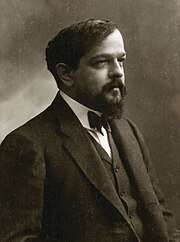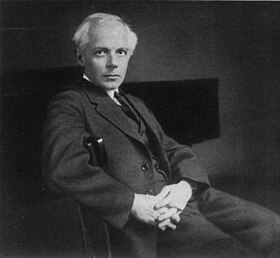Steve Reich

Claude Debussy

Achille-Claude Debussy (pronounced [aʃil klod dəbysi]) (August 22, 1862 – March 25, 1918) was a French composer. Along with Maurice Ravel, he is considered one of the most prominent figures working within the field of Impressionist music, though he himself intensely disliked the term when applied to his compositions. Debussy was not only among the most important of all French composers but also was a central figure in all European music at the turn of the twentieth century.
Debussy's music virtually defines the transition from late-Romantic music to twentieth century modernist music. In French literary circles, the style of this period was known as Symbolism, a movement that directly inspired Debussy both as a composer and as an active cultural participant.
3Gyorgy Ligeti
 György Sándor Ligeti (May 28, 1923 – June 12, 2006) was a Romanian born 20th century composer. Born to a Hungarian-speaking Jewish family, he briefly lived in Hungary before later becoming an Austrian citizen. Many of his works are well known in classical music circles, but to the general public, he is best known for the various pieces featured in the Stanley Kubrick films 2001: A Space Odyssey, The Shining, and Eyes Wide Shut.
György Sándor Ligeti (May 28, 1923 – June 12, 2006) was a Romanian born 20th century composer. Born to a Hungarian-speaking Jewish family, he briefly lived in Hungary before later becoming an Austrian citizen. Many of his works are well known in classical music circles, but to the general public, he is best known for the various pieces featured in the Stanley Kubrick films 2001: A Space Odyssey, The Shining, and Eyes Wide Shut. Béla Viktor János Bartók (March 25, 1881 – September 26, 1945) was a Hungarian composer and pianist, considered one of the greatest composers of the 20th century. Through his collection and analytical study of folk music he was one of the founders of ethnomusicology
Béla Viktor János Bartók (March 25, 1881 – September 26, 1945) was a Hungarian composer and pianist, considered one of the greatest composers of the 20th century. Through his collection and analytical study of folk music he was one of the founders of ethnomusicologyIgor Stravinsky

Stravinsky's compositional career was notable for its stylistic diversity. He first achieved international fame with three ballets commissioned by the impresario Sergei Diaghilev and performed by Diaghilev's Ballets Russes (Russian Ballets): L'Oiseau de feu ("The Firebird") (1910), Petrushka (1911/1947), and Le sacre du printemps ("The Rite of Spring") (1913). The Rite, whose premiere provoked a riot, transformed the way in which subsequent composers thought about rhythmic structure; to this day its vision of pagan rituals, enacted in an imaginary ancient Russia continues to dazzle and overwhelm audiences.
After this first Russian phase he turned to neoclassicism in the 1920s. The works from this period tended to make use of traditional musical forms (concerto grosso, fugue, symphony), frequently concealed a vein of intense emotion beneath a surface appearance of detachment or austerity, and often paid tribute to the music of earlier masters, for example J.S. Bach, Verdi, and Tchaikovsky.
In the 1950s he adopted serial procedures, using the new techniques over the final twenty years of his life to write works that were briefer and of greater rhythmic, harmonic, and textural complexity than his earlier music. Their intricacy notwithstanding, these pieces share traits with all of Stravinsky's earlier output; rhythmic energy, the construction of extended melodic ideas out of a few cells comprising only two or three notes, and clarity of form, instrumentation, and of utterance.
2 comments:
SK, I'm disappointed. Surely someone such as yourself would realise that your opinions, regardless of your formal knowledge of music, are infinitely more interesting than some garbage from wikipedia.
has escogido muy bien, quizás no este de acuerdo en el orden, pero la elección es magnífica.
También la Biblioteca de Babel es una de las cumbres de la literatura mundial
Saludos
Post a Comment